FORESTS FROM FARMS BLOG
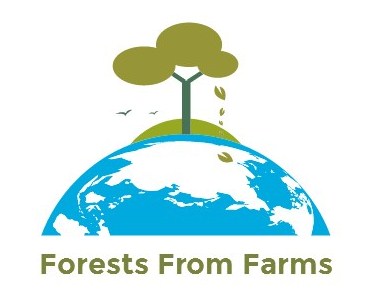
We continue with a new Blog 2018
France, 27 July 2018
The mysterious life of roe deer. What is happening here?
France, 16 July 2018
A mum with her offspring. These deer have permanently settled in the nature reserve @ForestsfromFarms (http://forestsfromfarms.org). We see them daily live and on camera's.
France, 27 June 2018
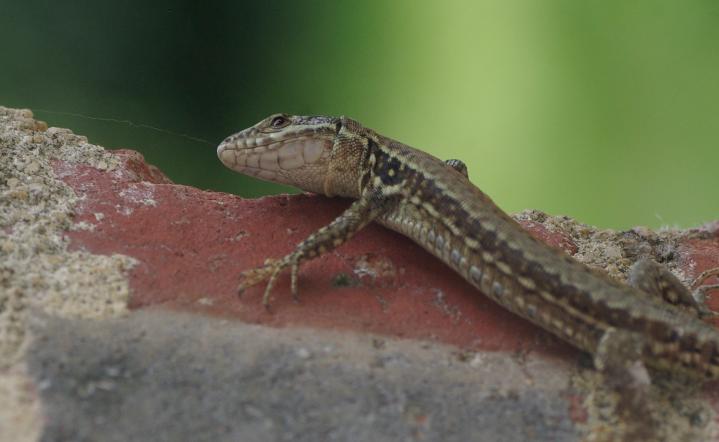
France, 26 June 2018
Stag beetles mating / deux lucane cerf-volant.
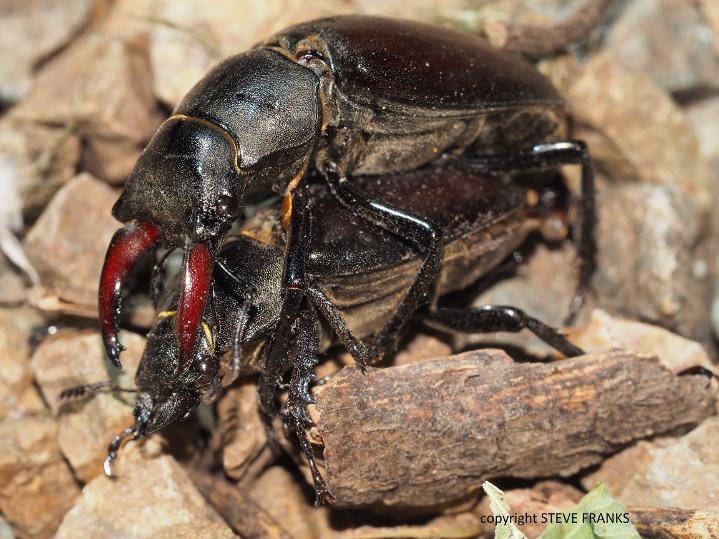
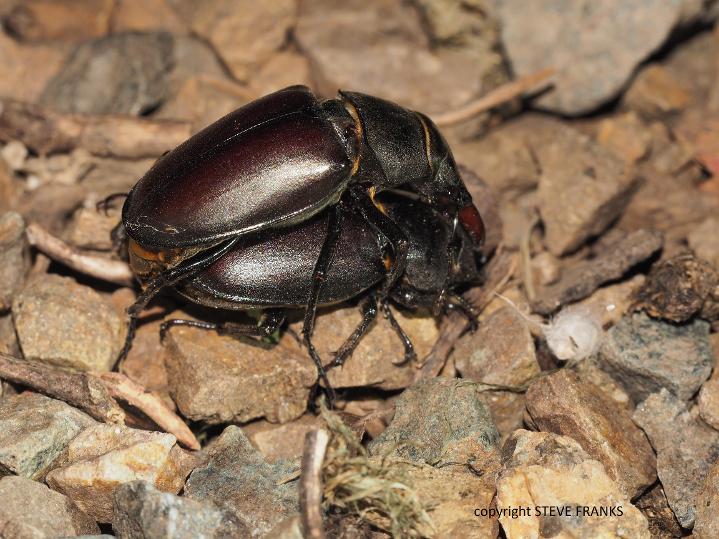
France, 26 Juin 2018
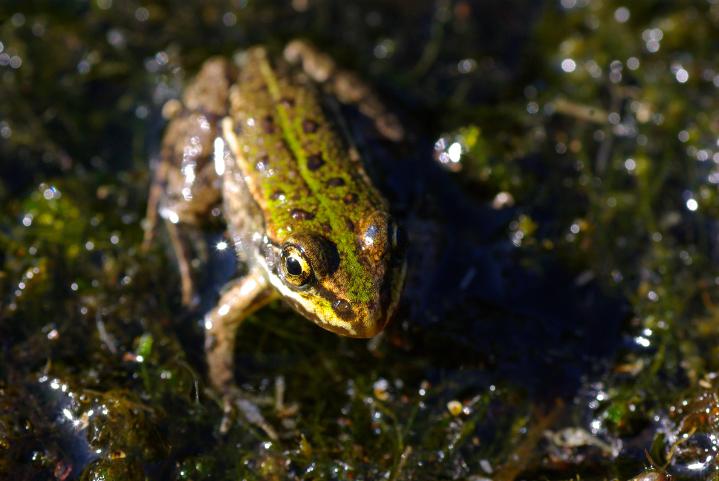
France, 25 June 2018
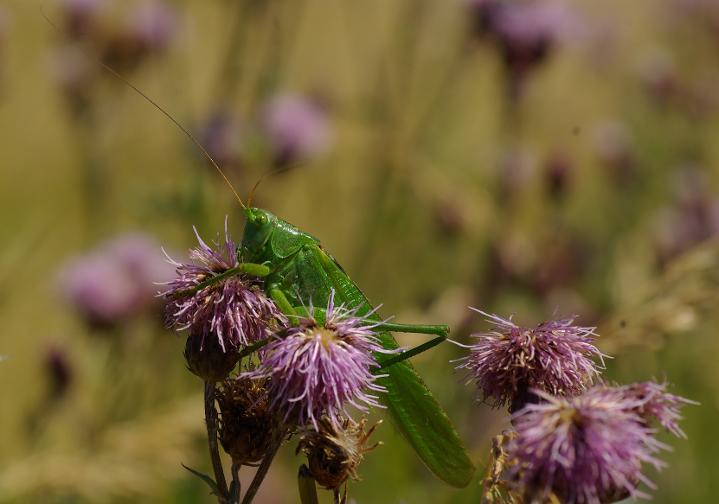
France, 19 June 2018
Tachybaptus ruficollis
A family of Little Grebe has settled on the pond
Une famille de Grèbe castagneux s'est installée dans le plan d'eau
Une famille de Grèbe castagneux s'est installée dans le plan d'eau
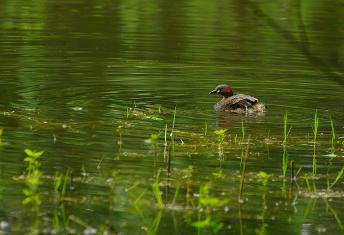
France, 15th of June 2018
The letter to the European Commission about the nature reserve Oostvaardersplassen in the Netherlands.
Le courrier (en anglais) à la Commission Européenne concernant la réserve nature Oostvaardersplassen aux Pays-Bas.
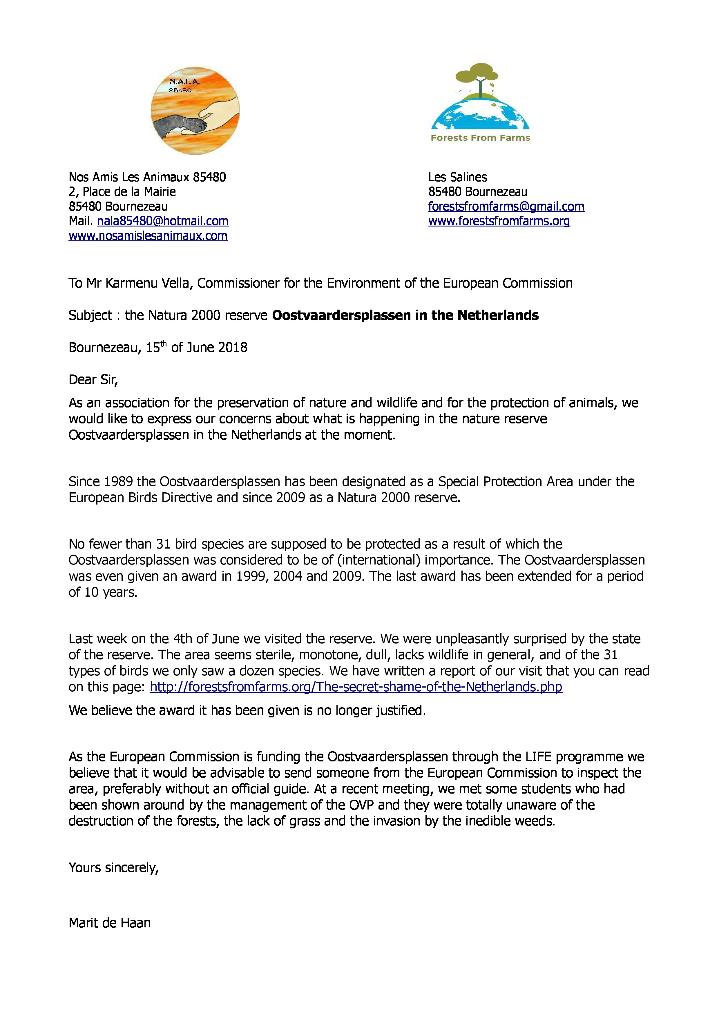
Netherlands, 3rd to 8th of June
The Secret Shame of the Netherlands
Our Visit to the Oostvaardersplassen in Flevoland - Holland
Since March 2018 we have been taking action on the misery that is called the Oostvaardersplassen in the Netherlands. So we decided to have a look for ourselves so that we would better know what is happening there. With our caravan and our two fellow travelers, Pindy the parrot and Sebright hen Henrietta, we left Friday, June 1 from the Vendée France, with a stopover in Douai, direction Almere camping.
Comme vous le savez peut-être, nous avons décidé de nous mobiliser contre la maltraitance ou la négligence des grands herbivores, les Chevaux Konik (ici en France on les nomme les Tarpans), les Vaches Auroch et les cerfs dans les Oostvaardersplassen aux Pays-Bas. Après avoir écrit plusieurs articles surtout en anglais et néerlandais (vous les trouvez sous ce lien http://forestsfromfarms.org/Oostvaardersplassen-Holland.php ) nous avons décidé d’y aller voir nous-mêmes, et de former notre propre impression de la situation. Nous sommes partis vendredi le premier juin. Vour pouvez lire le compte rendu de la visite ici sur facebook
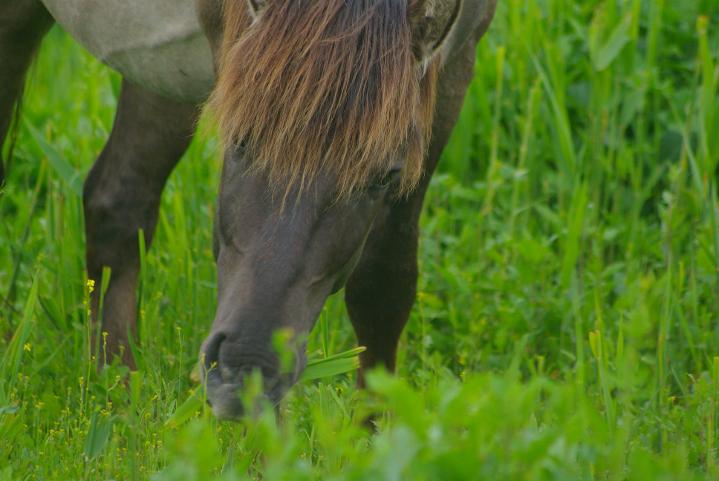
France, 25 May 2018
Roe Deer
(la traduction en français de cet article se trouve sur la page facebook
de nederlandse vertaling van dit artikel is te vinden op facebook)
We have Roe deer living on our land. They go their own way, have a life of their own about which we really know very little. Every now and then we find ourselves a few meters away from a deer, but they soon run away. We have put some cameras that respond to movement in the most strategic places.
It is always a surprise to see what is in those photos.
A while ago we met a very special man, Geoffroy Delorne. He lived with deer for many years in a forest in Normandy. He wrote a book about his experiences, "My wild life with the deer" (Ma vie sauvage avec les chevreuils). His book has touched me deeply. That is why I would like to share his experiences with you.
Due to circumstances Geoffroy Delorne moved away from his human family. From an early age he was already fascinated by nature. In the end, the deer became his family. He made many friendships. First with a young male deer, who he named Daguet. Roe deer are very curious and they are very territorial. Suddenly there was this stranger, a human animal, who settled on Daguet's territory.
Very slowly Geoffroy was able to win his trust. Geoffroy and Daguet eventually lived together in their own territory.
Geoffroy survived at first mainly on tinned food, that he occasionally took from his parental home at night. But at one stage all the food was hidden. This really shows to what extent his relationship with his family had deteriorated. And so Geoffroy learned from the deer what plants to eat, which leaves. There were also mushrooms and fruits. After Daguet, more and more deer came closer. What I did not know, but what I have already been able to see in our photos, is that deer come together in the winter. Whole families. And then in the spring and summer each goes his own way. The females are looking for a place, and it is almost always the same spot every year, to give birth to their little ones.
The males go their own way and leave them alone.
Geoffroy has followed a number of generations of families. He saw how the little ones grew up and had their own little ones as well How only later did the mother entrust their little ones to him. What is so beautifully described in his book are the emotions these animals have. He sees couples of males and females (some are monogamous / stay together all their lives, and others do not (just like people really)), and how there is affection between these couples, he sees how little ones are born, the pain, but then also the joy and the care for their babies that he later shares with them, and then finally the pain when that deerchild is shot by a hunter and the grief that ensues for several weeks.
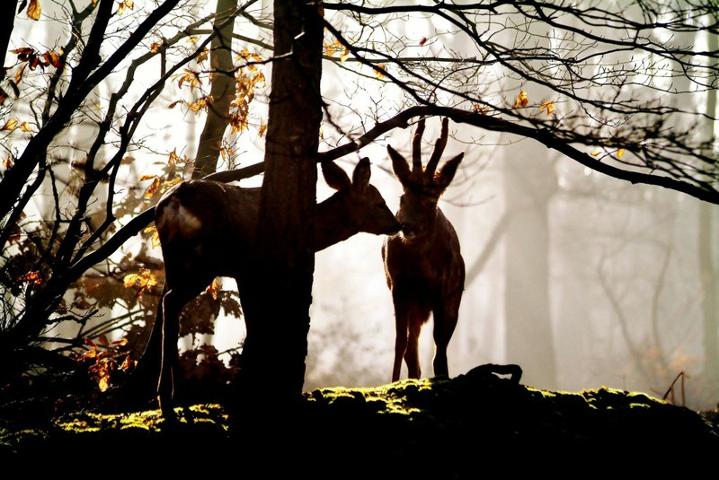
Every deer has his own character, his own intelligence. After that experience with the hunter he was able to teach certain deer how to prepare and protect themselves by hiding in a forest where hunting is forbidden (a Natura 2000 area).
But hunters are not the only danger for the deer. Many forests in France are used for wood production. If a Roe deer has taken over a territory because of lack of space and then the trees are all cut down in one go, then there is not much left for him, no food, he becomes weak and therefore doesn't have the strength to fight for a new territory.
For Geoffroy, his family is and will remain the deer (which he now also shares with his new lady-friend). He talks to them. And they talk to him. They share their joy but also their grief. But malnutrition affected him in the end and he decided to leave his family and the forest (not forever, as he still comes back), especially to order to be able totell their story. To make people realize that the forests are important for these animals, for all animals. That our entire economic system is wrong and is based on taking more and more, without considering our environment
and that of our fellow residents.
I advise everyone who knows a little bit of French to read the book. The French is very well written
and simple enough for someone who knows a bit of French to understand.
I look differently at "our" little deer after having read this book. I learned a lot. Have gained tremendous respect for these animals. A pregnant Roe deer has settled on our premises.
I now know that it is probably the same one from last year. Just like last year, I hope to see a photo of her young very soon. The way Geoffroy has lived with his life, we will of course never be able to. But according to him they know that they are safe here, that they recognize us by our smell ;-) and that we are welcome in their territory.
The latest photos of the deer will be published on the forests from farms facebook page and on this site. Keep an eye on it. And we will continue to search for new properties, forests, agricultural land here in France or elsewhere to give these animals a permanent place without hunters, without treefellers and without danger.
A small update since this morning: There she is. For a week it has been clear that she is no longer pregnant, but where was her little one? We could not see him or her in the pictures. Obviously hidden somewhere in the grass. And here they are, finally, together.
France, 24 May 2018
L'association #ForestsFromFarms a été invitée à assister à l'évènement d'#Alternatiba. Nous serons ravis de les joindre le samedi 30 juin avec un stand à la Maison de Quartier de la Vallée Verte La Roche sur Yon. Merci !!  Alternatiba sur facebook
Alternatiba sur facebook
 Alternatiba sur facebook
Alternatiba sur facebook France, 22 May 2018
France, 20 May 2018
La mare/ The large pond more photos on facebook
France, 16 May 2018
A Coypu grazing the grass
France, 10 May 2018
A weasel/une fouine
France, 7 May 2018
Still pregnant/toujours enceinte
France, 3 May 2018
A pregnant female finds refuge in the fields/Une chevrette enceinte cherche refuge sur le terrein
France 2 May 2018
From farmland to forest in 16 years/La transformation d'une ferme en forêt en 16 ans.
France 1 May 2018
Swallowtail butterfly encounter
France 29 April 2018
France 28 April 2018
Café débat "Ma vie sauvage avec les chevreuils."
Un grand grand merci à Goeffroy Delorne https://www.facebook.com/Ma-Vie-Sauvage-Avec-Les-Chevreuil…/ d'être venue à La Roche-sur-Yon, Vendée, de nous informer de la vie sécrète des chevreuils et son amitié avec ces animaux magnifiques, de nous montrer qu'ils nous respectent, nous, les êtres humains, si on ne les veut pas de mal, de nous racconter de sa vie dans les forêts que nous devrons protéger mais aussi partager avec la vie sauvage en général. Merci! au Grand Café, de La Roche sur Yon de nous avoir reçu cet après-midi. Personnellement nous n'allons pas oublier cette belle rencontre. Merci! https://www.facebook.com/legrandcafelarochesuryon/
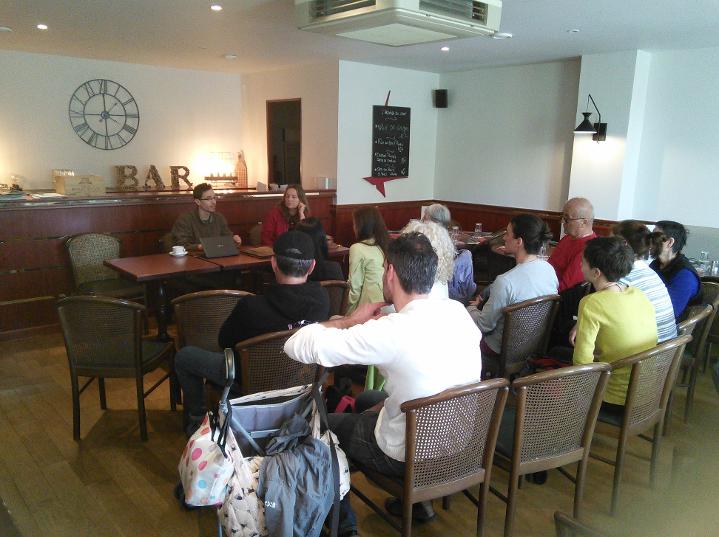
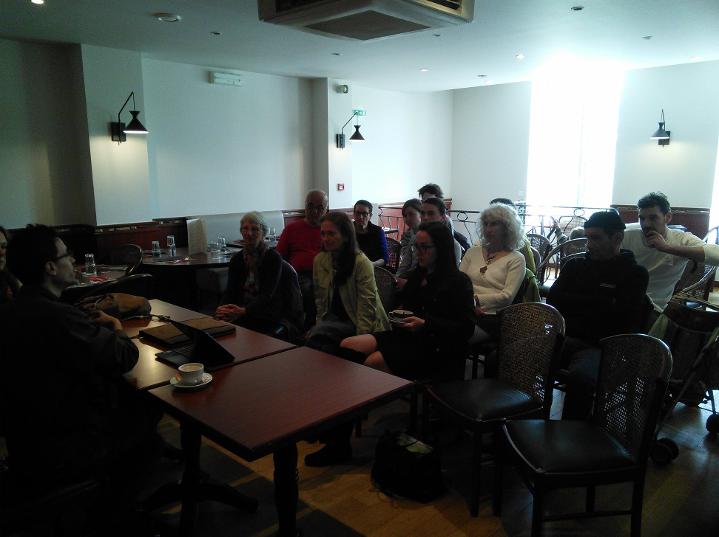
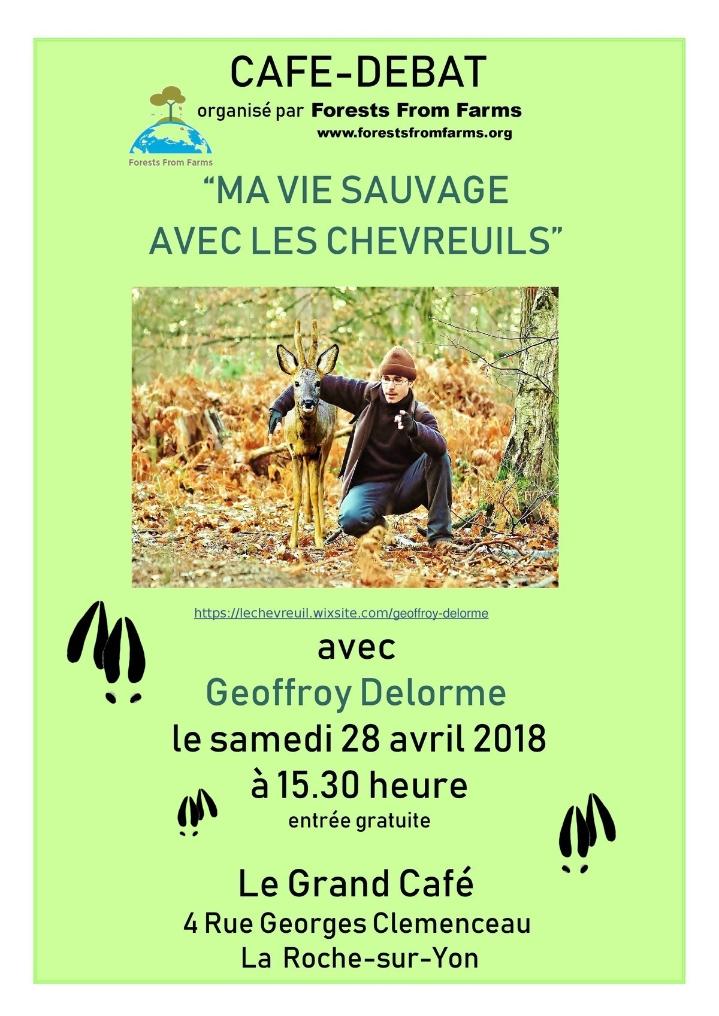
France 26 April 2018
A grey Heron and a couple of little Grebes in the big pond
France, 23 April 2018
A common moorhen family has found its home in the large pond with the geese
France, 16 April 2018 Dances with geese @ForestsfromFarms
France, 29 March 2018
The 3 baby deer from last year are still together. A bit bigger though. We are glad they survived the hunters this year (with a little bit of our help ;-) )
France, 25 March 2018
Roe Deer on Forests from Farms
France, 19 March 2018
The frogs are back in a bond never ever been so full! Spring is coming!
France, 6 March 2018
The association Forests from Farms organises a presentation and discussion around the new book "My life in the wild with deer" written by Geoffroy Delorme in La Roche sur Yon Vendée France
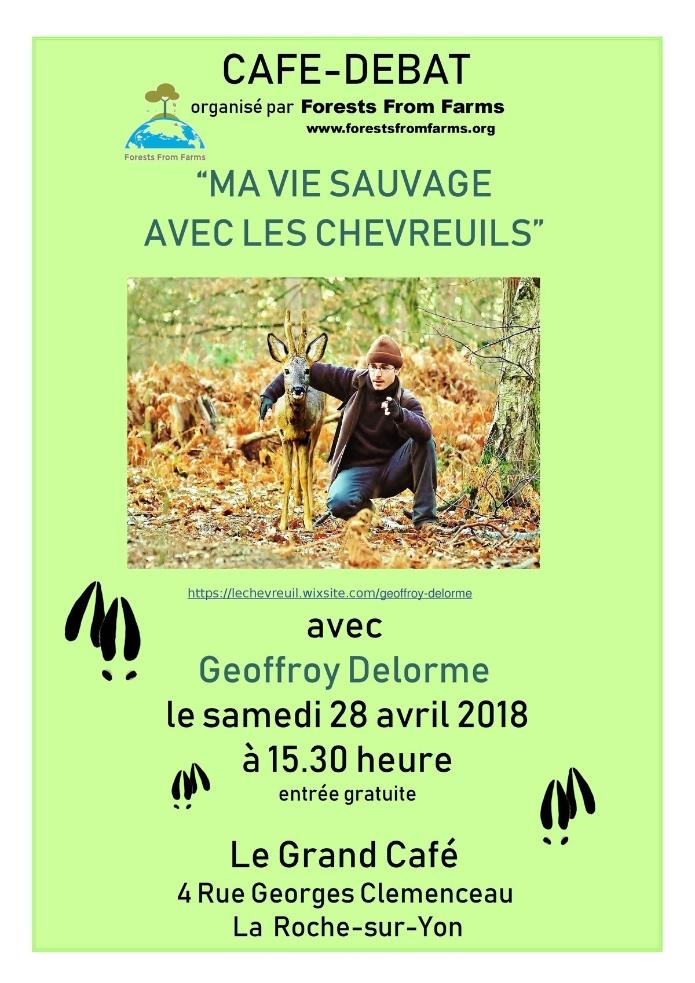
France, 3 March 2018
For #Worldwildlifeday a compilation of last weeks captures on video of the animals living on Forests from Farms. Enjoy!
France, 26 February 2018
Early in the morning the deer are already out and about!
France, 17 February 2018
Grey heron and geese at the lake
France, 16 February 2018
Application for a french subsidy
Forests from Farms has applied within the programme "My project for the planet" organized by the french ministry of the environment. If the project is accepted we will get financial aid to buy more agricultural land in France to transform it into a new forest where nature can thrive. Fingers crossed.
France, 13 February 2018
Deer near the lake
France, 13 February 2018
Insects on Forests from Farms
Photographer Steve Franks from Deal (UK) regularly visits #ForestsfromFarms and takes photos of animals, insects especially. Please find an impression on his Flickr account by clicking the button below.
France, 12 February 2018
Woodpecker at work @ Forests from Farms
France, 9 February 2018
Forests from Farms in winter
France, 27 January 2018
Happy Deer
France, 12 January 2018
Best of 2017
France, 9 January 2018
The very first genet we see on Forests from Farms. Read more about the common genet on wikipedia
France, 29 November 2017
Autumn Colors Galore @Forests from Farms
France, 16 September 2017
The very first sight of a badger on Forests from Farms
France, 11 September 2017
The deer have returned...
...after having spent the summer in the maize fields
France, 15 July 2017
The magical beauty of nature
The Hummingbird moth ( Macroglossum stellatarum) in an Albizia tree
France, 17 June 2017 And more deer
France, 16 June 2017
Wishing you a good weekend
France, 3 June 2017
How we mow the field ... with an old tractor
France, 22 Mai 2017
Spring in all its' glory continues
Bambie now 10 days old
France, 22 Mai 2017 Spring in all its' glory
Enjoy! (NB these deer are filmed with a hidden camera. The animals are not disturbed.)
France, 13 May 2017
Our tiny little forest from farms, but every little bit helps!
Our tiny contribution to combat climate change is visible on this map. Below an image from the interactive map taken from the site: Global Forest Watch http://www.globalforestwatch.org/map/3/16.35/29.81/FRA/grayscale/loss,forestgain?tab=analysis-tab&begin=2001-01-01&end=2016-01-01&threshold=30
The map shows Bournezeau, in the west of France - the Vendée. Blue means new wood, red means wood destroyed. You can actually see a tiny little blue dot next to Forests from Farms. Climate change is happening. We have to stop it!
France, 2 May 2017
Forests from Farms supports the Living Land initiative
Farming is devastating our climate and the environment, wiping out wildlife, harming public health, and it is failing small and medium sized farmers as well as rural communities.
And the main driver behind all this is the Common Agriculture Policy (CAP) – one of the EU’s oldest, most influential, most debated and most costly policies.
As you may have read in a previous post on the Forests from Farms site the European Commission launched a major online Public Consultation on the future of the CAP.
Living Land was launched by WWF, Birdlife Europe and the European Environmental Bureau, to react to this public consultation. The Living Land initiative calls for an EU agricultural policy that protects our climate and environment, is fair for farmers and consumers, and contributes to healthy and sustainable food production. 258,708 citizens and 600 organisations, of which also the association Forest form Farms, joined in. The Living Land Initiative sent its' contribution to the EU public consultation on the 2nd of May.
Forests from Farms also sent in its' own contribution that you can read here (only in english)
France, 15 april 2017
Deer playing in the hay in the field
This is what we do it for: to give animals a home. Enjoy this little video of deer playing in the field in the little hay stags I have been trying to make just a couple of days before for the rabbit. ;-)
France, 10 february 2017
Proposition for reform/modification of the Common Agricultural Policy
The 2nd of February the European Commission launched a public consultation on the future of the Common Agricultural Policy. For three months it gives anyone interested, citizens, organisations, associations and any other interested parties the chance to have their say on the future of the Common Agricultural Policy. The input will be used for a draft Commission communication about its' potential policy options for the future. We have prepared a document which we sent to the Commission with our thoughts about the future of farming, animal farming in particular. We invite everyone to do the same. You can read our contribution if you click on the button below. If you agree with our analysis feel free to use any information you find useful from our contribution.
France, 22 January 2017
No Future
The other day I bumped into a young lady that I vaguely knew and stopped to chat. She told me that she had just finished her studies and was looking for work. So of course I asked her what she had studied. "Agriculture" was her reply. And then she added, "And I really want to work in the livestock sector." "Why livestock?" I enquired. "Because I love meat," she told me.
That made it difficult to carry on a meaningful conversation, but not perhaps for the reason that you imagine. It wasn't so much that we were obviously not kindred spirits. To my surprise, and I know that it will seem patronising at first sight, my reaction was to feel pity for her.
However, it wasn't anything to do with her eating habits even though eating meat is most likely to affect her health negatively and shorten her life. No, it was the fact that during all her years of education no-one had informed her of the harm caused by the meat industry. In addition, she had been lead to believe that she could make a life long career in that industry. It's all the more surprising as it's no secret that the number of people employed in agriculture in France has been falling for decades from about 3.85 million in 1970 to about 965.000 in 2010. https://www.insee.fr/fr/statistiques/fichier/1374189/ASF_102DD1.xls
That's on average about 200 jobs lost per day every day for forty years.
The reason is, basically, improvements in productivity thanks to more mechanisation and economies of scale. In other words bigger and bigger farms and more and more machinery. The ironic thing is that in their applications for planning permission these mega farms claim to create jobs. However it is quite clear that a farm that employs four people to look after 1,000 animals provides less employment than ten farms each with two employees and 100 animals. These mega farms can produce meat more cheaply, but that is often paid for by a reduction in animal welfare.
However, these farms are trying to buck a trend: meat consumption in France is falling. Therefore, they are targeting the export market. This is likely to lead to the European taxpayer subsidising an increase in meat consumption, with all its negative health consequences, in other countries while retaining the pollution in Europe.
One country of interest is China which has a middle class that is becoming increasingly affluent and able to afford to eat more meat. However, China has a shortage of arable land. The thinking is that it can't afford the inefficiency of growing crops to feed to animals for people to eat. Hence, it's seen as a good, long-term customer for buying meat. What is often ignored is that China, along with many other countries, is acquiring arable land in other countries.
So although the French meat industry is investing in new farms that are supposed to have a payback period of a couple of decades, it is quite possible that their target market will disappear in the near future.
In addition, more and more people are becoming aware of the contribution that livestock makes to climate change. Is it possible that the industry will escape measures to reduce its effects? I think that that is highly unlikely. So although when I left that young lady I wished her good luck, I didn't rate her chances very high.
France, 6 Janvier 2017
l'Association Forest From Farms enregistrée dans l'Annuaire des Associations de Vendée
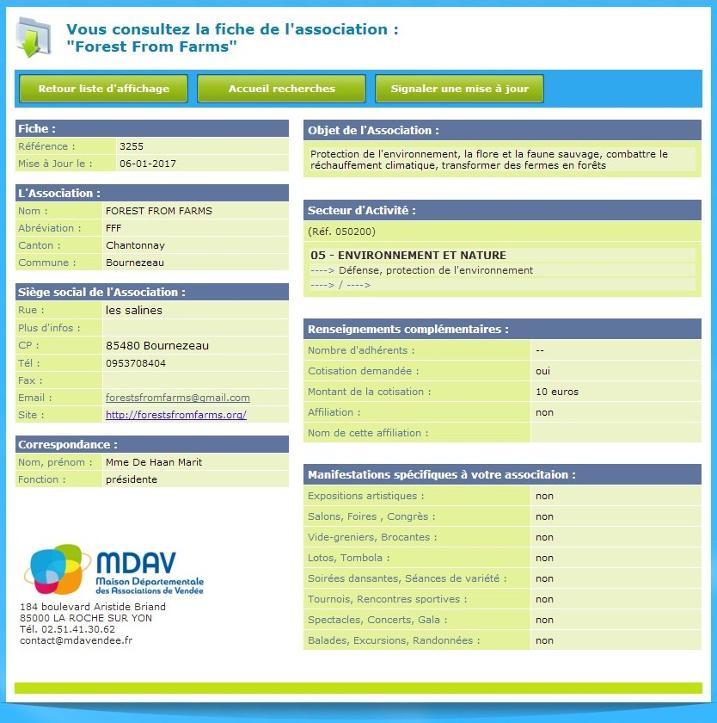
France, 1st of January 2017
The elephant in the room...
I'm reading an interesting book "Saving Ourselves: Interviews with World Leaders on the Sustainable Transition" by Yacine Belhaj-Bouabdallah. As you've probably guessed from the title it contains comments from various world leaders and experts on a number of subjects dealing with the environment.
One such issue is agriculture and feeding the world. It was generally acknowledged that there is enough food available to feed everybody and that waste and distribution problems contribute to people in some areas of the world being malnourished. There was also some concern about population growth. However, in general, most comments, in my view, were optimistic about the trajectory of population growth and that birth rates are becoming manageable. It was interesting to discover that there is real concern about the fertility rate being too low in some countries: this, coupled with people living longer, can lead to a situation where there are not enough workers to support the retired people.
There was some discussion about the improvements in the productivity of agriculture in the more developed countries and how the methods could be applied in less developed areas of the world which rely mainly on smallholder farmers. These farmers do not yet benefit much from the technological advances used to increase productivity in developed countries. Such advances rely a lot on intensive use of resources such as fertilizer, water, pesticides and herbicides as well as fossil fuels to run their machinery. As most of us are aware, this brings its own set of problems, such as chemical residues in water, fertiliser run-off into rivers and seas, herbicide resistant weeds etc.
Steps are being taken in developed countries to solve these problems through better and more precise use of resources by selectively choosing the crops and the inputs that best suit the area. With some support, these techniques could be applied to developing countries to enable them to leapfrog the wasteful and high polluting, intensive use stage of improving agricultural production.
Another issue in developing countries is that a lot of the losses occur post harvest. It appears that better distribution chains and storage facilities could lead to a reduction in crops being wasted through spoilage, rot and infestation. A lack of financing is also a problem for farmers, especially in areas where women can not get loans. In some areas, most of the farmers are tenants and the land is owned by a small number of individuals: these people can slow down or block measures that could improve overall productivity that benefit their country because it is not in their own personal best interest.
So overall there was some optimism that we can feed the world for the foreseeable future even though it might require increasing the amount of land under cultivation in Africa by 50%. Unfortunately there was no real acknowledgement of one of the biggest wastes of agricultural resources and one of the biggest contributors to climate change: livestock farming.
I was really quite surprised by this as the environmental consequences are very well known: GHG emissions, excessive water use, degradation of soils and water sources, antibiotic resistance,etc. The harmful effects on people are also well-known: richer countries paying poorer countries to produce feedstuff for animals rather than producing food that their own people can eat directly and the well known negative effects on health: cardiovascular diseases, strokes, diabetes, cancer etc that accompany every animal product based dish. And the waste and immorality of feeding on average 3 calories to an animal to produce one calorie of meat when people are going hungry.
The really odd thing is that for the consumer a vegetarian or vegan diet is much cheaper than a diet based on animal products. There is a lot of money invested in the livestock industry and a lot is spent on advertising to encourage people to eat animal products. Is that a reason why vegan/vegetarian diets are not talked about and promoted? Is this another example of vested interests and money influencing policy?
Whatever the reason, the consequences of eating meat, fish, eggs and dairy products should be given a more prominent position in the discussion on sustainable development. You can help by spreading the word and explaining why people should go vegan.
Nigel
France, 31 December 2016
Happy New Year from Forests from Farms
These photos were taken the very last day of december 2016. It was a lovely, but cold, day today. Snow is expected, which is quite rare in the west of France. Nature is beautiful! Let's cherish it.
France, 20 December 2016
Anti-speciesism and climate change
There's a nifty little tool that enables you to see the effects of various actions on climate change. It's called the Global Calculator and it's available on-line here: http://tool.globalcalculator.org/
It's probably a good idea to open it in another tab now, so that you can see more clearly what I'm talking about...
After the introductory page you are presented with the "business as usual" (BAU) scenario: that's the one where we blithely destroy the environment by carrying on the way we are at the moment. There's an icon of a thermometer and if you hover over it with your mouse pointer it shows an estimated temperature global mean temperature change of between 1.9 and 6°C by 2100. This is most emphatically not good: we should be trying to keep the temperature change at less than 2°C.
Below the graphs and the thermometer you will see a number of boxes with yellow lines in them: the one that I would like you to take a close look at is on the bottom left and is called "DIET". When you click on the little arrow next to it, it expands to show three options that you can adjust individually. Let's take a look at the "Quantity of meat" option.
It's already on level 2.0 which, as you can see by hovering your pointer over it, means that the average person globally gets 220 kcal/day from meat. This is up from the 2011 estimate of 187 kcal/day.
Now click on the level 4.0 box, which corresponds to 14 kcal/day: the amount of meat consumed by the average Indian in 2011. The effect on global average temperature change is dramatic: it's now only 0.8 to 3.4°C compared to 1.9 to 6.0°C under the BAU scenario.
Quite simply, the lifestyle change that an individual in the developed world can make which has biggest effect towards combatting climate change is to give up eating meat.
You may be puzzled as to why this has such a large effect. The little "i" next to the "Quantity of meat" lever takes you to an explanation. Mainly, it's because eating meat is a very inefficient way of getting calories and proteins. The food that is given to animals is not all converted into meat: it's used for making their bones and their fur or feathers. They also use some of the food to keep alive and move around. At best, for every two calories fed to a chicken or a pig you get one calorie of meat. At worst, it can take fifteen or more calories fed to cattle to provide one calorie of meat.
All this extra food that has to be fed to animals comes with an environmental cost too, as more land has to be cultivated. Land use change is a big contributor to climate change: cutting down forests for pasture or cropland not only releases a lot of carbon dioxide, but also reduces the number of trees available to absorb carbon dioxide. By reducing the amount of food given to animals, we could allow the surplus pasture or cropland that is used to feed them to be used for biofuels or
for reestablishing forests, thereby reducing greenhouse gas emissions.
And all the excess food fed to animals leads to more waste products: their dung and their urine and the methane excreted by ruminants which is a very powerful greenhouse gas. In addition, you have all the energy expanded on looking after the animals, transporting them, killing them, refrigerating them, transporting bits of them to be sold etc.
Other consequences that are not taken into account in the Global Calculator are the effects on people's health of eating meat: cancers, diabetes, obesity, heart disease etc. All these have a cost to the economy as well through medical bills and lost productivity http://www.pnas.org/content/113/15/4146.full
By now the message should be clear. For your own health and the health of the environment: Go vegan!
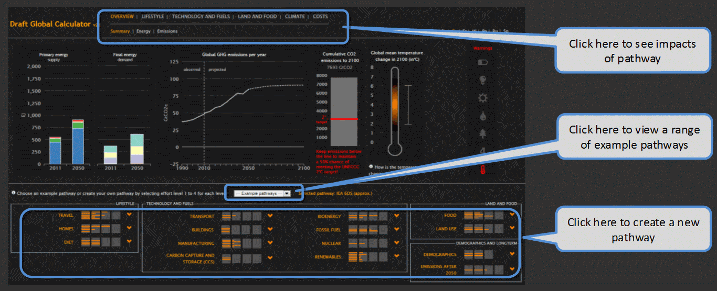
France, 11 december 2016
Veganuary
The verb "to work" followed by a direct object can have different meanings depending on how it's used. For example, you can work a piece of metal to give it a new shape or you can work a horse to get something done. You can also use it to complain about being given too much to do by saying that your boss is working you to death.
The other day, driving through the countryside and seeing the bare, ploughed fields started me wondering about the phrase "working the land." If you look at the picture below, you also might wonder whether it was worked to give it a new shape, worked to give a useful result or worked to death.
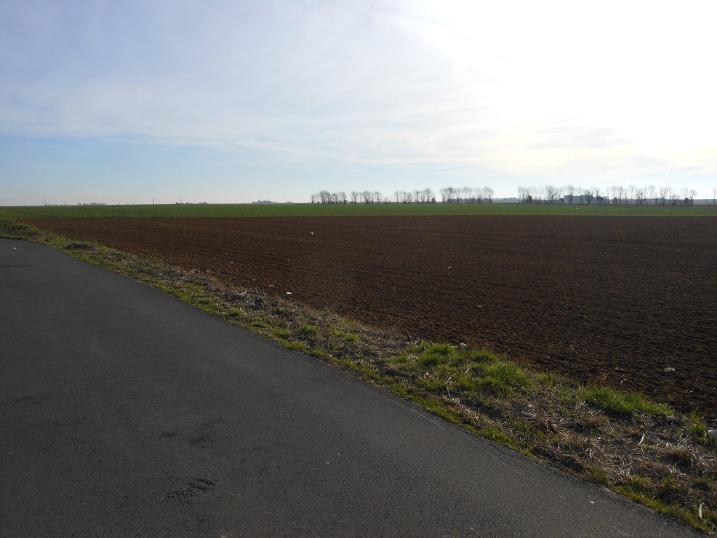
Photo of bare fields
Compare those bare fields to untouched, unworked, pasture.
Photo of our field
They look dead and sterile: what food and shelter do they provide to the wildlife? The soil lies bare to the elements: losing water faster than if it had a protective cover of plants. Drying out it becomes friable and more susceptible to erosion, allowing the fertile soil to be picked up and blown away by the wind. The habitat of the vital earthworm has been disturbed, reducing their numbers and the natural predators of crop pests will have had their numbers reduced as well.
Yes, in a few months the fields will probably bloom with new crops, but only a single variety of plant, a monoculture, that will satisfy the needs of a limited range of wildlife. And they will most probably be treated with herbicides and pesticides to ruthlessly prevent unruly Nature from interfering with the generation of a profit.
It's all so unnecessary: we subsidise the farmers so that they produce as much as possible and then we waste vast amounts of food. A major source of waste is not what is left on the shops' shelves or what you leave on the side of your plate. In the developed world, a huge amount of food is wasted by giving it to animals to eat, so that we can then eat the animals. Does it really make sense to feed anything up to fifteen calories to a cow to produce one calorie of meat?
It's only possible because we don't look at the hidden costs of eating meat: I've already alluded to the loss of habitat and the ensuing loss in biodiversity. To those we have to add excessive use of water: anything between 5 to 20 tonnes is needed to produce one kilo of beef. It seems too incredible to be true, but you can save more water by refraining from eating a single hamburger, than by giving up washing for a month... and your entourage will probably appreciate it more.
There's pollution as well: greenhouse gas emissions in the air, excess nitrogen and phosphorous waste in the water and toxic residues from herbicides and pesticides in both the soil and the water.
Another hidden cost is due to the overuse of antibiotics in livestock raising: apparently 50% of the antibiotics used in the UK are given to animals: in the USA it's nearer 80%. This is worrying health experts who are concerned that this is leading to an increase in antibiotic resistant bacteria that could render many antibiotics ineffective.
An issue that is much closer to all of us is our own personal health: the mainstream scientific opinion seems to be that eating meat is not good for you. Of course, over the years, we've all heard so many various media reports of things that are good or bad for us that we tend to take such warnings with, if I dare, a pinch of salt.
But why not give it a go anyway and see what happens? January is the month of good resolutions and the Veganuary.com initiative is one of them. Why not try to give up meat for the rest of the month? It's good for the environment, it's better for your wallet and your health and it's best for the animals!
France, 7 december 2016
Registration FFF confirmed
The Association Forests From Farms is launched on the first of december 2016 and registered in the Vendée, France. See confirmation below
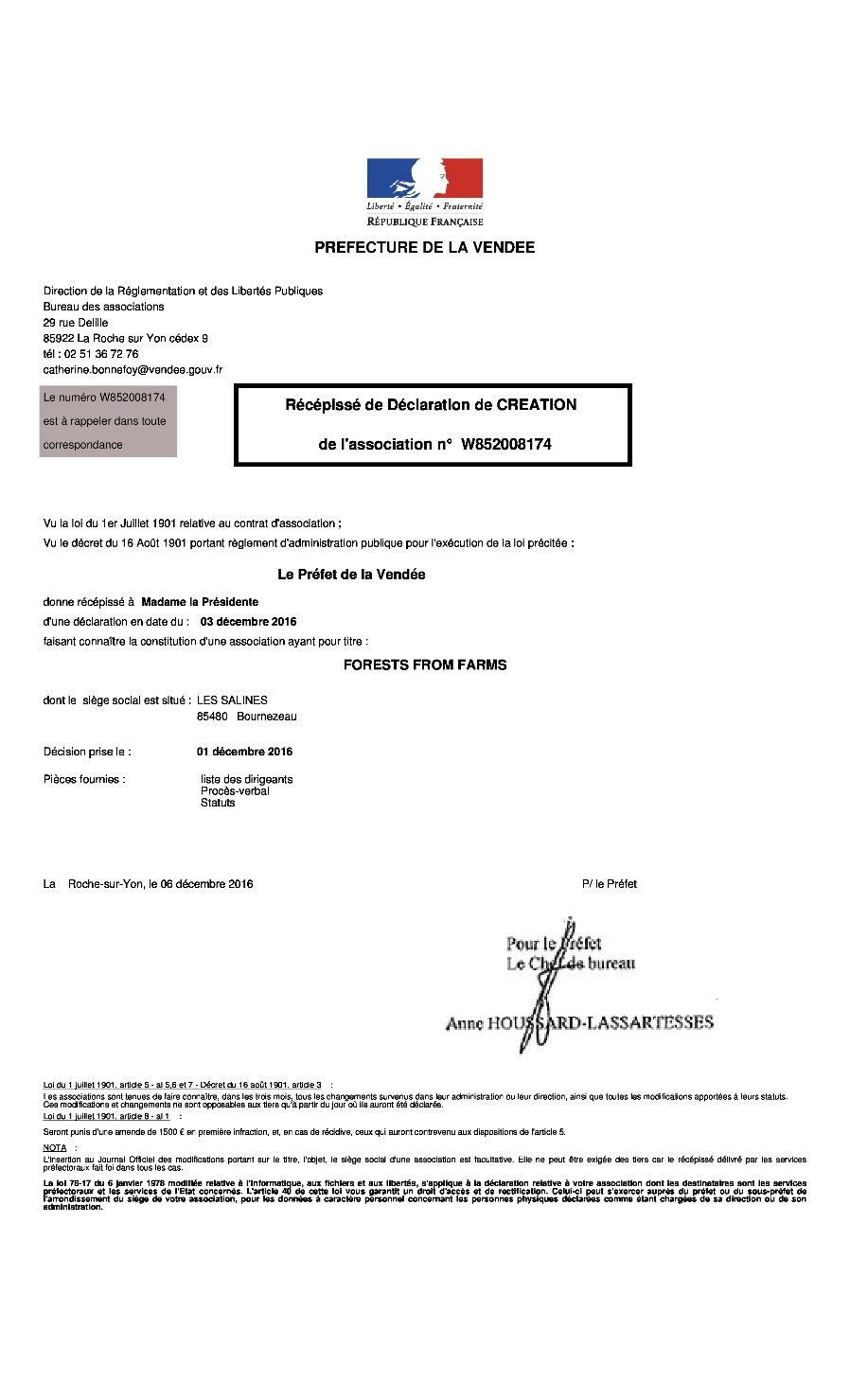
France, 5 december 2016
Our vision for a common future
At the moment animal welfare is becoming a hot issue in the political world. A Party for the Animals has recently been created in France , a number of candidates for the presidential elections include animal welfare in their programs and a manifesto Animal Politique has been prepared by 26 associations and sent to them...
On the other hand, there are other matters that are no less important. One is the crisis in the agricultural sector which has lasted for many decades. Farmers in the livestock industry have been in difficulties for a long time and it will only get worse. Until now they have not had any particular vision for the future, been pampered by the government, and regularly given financial help to keep the farmers working and producing. Many small farmers barely scrape a living or have gone bankrupt. They can't find anyone to take over their business. Children very often want something else better than taking over the farm of their parents. Farms are being sold to the neighbouring farm. So farms are getting bigger and bigger, employing fewer and fewer staff and animal welfare is getting worse in the name of efficiency. Keeping large numbers of animals together creates not only welfare problems but problems of disease, excess manure production and water and air pollution etc.
In addition, the debate in our modern society today is starting to focus on ethics: can we continue to use animals to feed ourselves, for our clothes, for our entertainment, for research, etc. Every day new studies are published. Scientific research proves that animals are sensitive, sentient, intelligent, that they can feel all sorts of emotions and that we should abandon the widespread idea that we can exploit these animals as machines.
Another important issue that may be neglected when discussing the environmental, ethical and economic disaster that is the raising of livestock, is climate change. The issue of climate change and the impact animal farming has on the environment is widely ignored in discussions on national, international and global level. Animal farming, thanks to its associated emissions and the change in land use is probably the second biggest polluter and cause of climate change. Although saving individual animals is useful and directly rewarding, we often ask ourselves what is the point, as our whole biosphere is in danger.
All these issues plus health issues (obesity and diseases, bacterial resistance to antibiotics), deforestation, freshwater shortages, extinction of wild animals and humane issues (famine in other parts of the world) have convinced us that large scale animal farming will disappear in the long term. This might seem shocking but there is no way around it. We should stop pretending to young people that they can have a life long career in raising livestock and that it's worth investing in new infrastructure. The crisis in the livestock industry won't go away! It is a waste of money subsidising the farmers so that they can carry on with business as usual. Our governments should invest in reconversion, retraining of farmers, helping them to get other jobs elsewhere. And looking for solutions to improve animal welfare should not be a specific goal per se, but should be done parallel to the process of phasing out animal farming. It should be clear that we are talking about the far future. We are very well aware that this is a situation that will not be solved in one or two years, even in 20 or 30 years. But we can't pretend and need to act fast. Climate change is already happening and it will only get worse, unless we do something about it now.
We are disappointed that these two issues, climate change and ethics are not or hardly dealt with in the manifeste Animal Politique, in the programs of the political parties for animals in France, by the deputes and senators, by the (french)government, by the EU.....
On the 7th of november, the starting date of COP 22 in Marrakech, we already sent a more detailed letter (see here) about this problem to the ministers Le Foll and Royal, the deputes and senators. This letter is a reaction to the few replies we got on this letter.